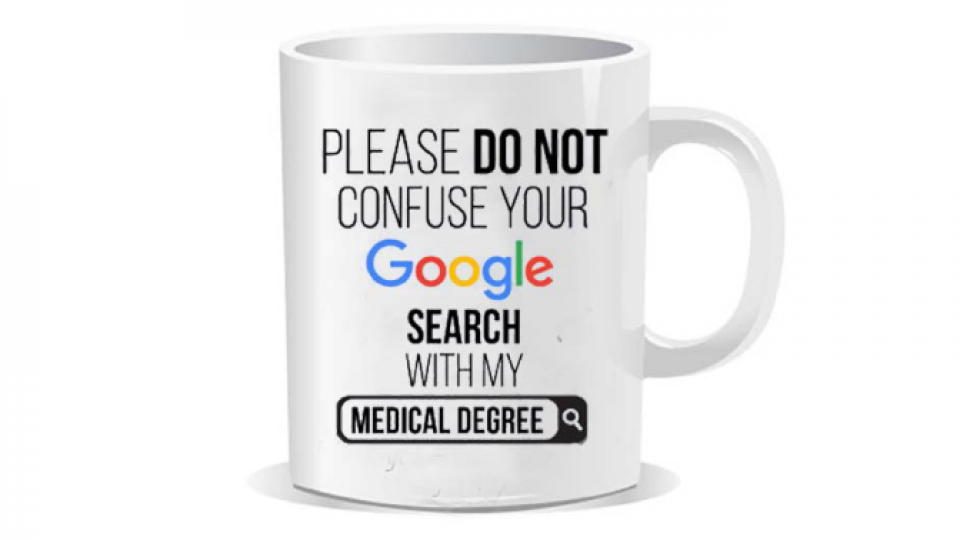Doing Research with “Dr. Google”

You have probably seen the coffee mug floating around the Internet that reads: “Please Do Not Confuse Your Google Search with my Medical Degree.” Although many individuals may chuckle and not give the mug another thought, others find it quite bothersome.
Many doctors, unfortunately, carry this attitude with them to medical facilities every day. The second a patient says, “Well, I read online that…,” the doctor immediately interrupts the patient. The doctor shuts down the patient’s concerns and worries because, surely, the patient does not know how to properly research medical conditions and symptoms.
This is a poor attitude for doctors. Rather than have patients who do not care about their health, shouldn’t they be grateful to have patients who take the time to research what they are experiencing so they can have an open and candid discussion? Doctors should feel refreshed when patients come into their offices with baseline information. They should treat them as allies, not adversaries.
Many experts recommend that patients conduct research and ask questions of their doctors, and some patients heed this advice. One statistic shows that 7 out of 10 patients search online for information about specific illnesses and treatments before seeing a doctor. Some experts and patient safety advocates recommend printing out medical information from the Internet and taking it to appointments.
There is a difference, however, between asking questions to understand and advance patient safety and undermining a doctor’s advice. Asking questions can encourage a comprehensive conversation between doctor and patient. For example, consider an elderly woman who is in the hospital. She is diabetic, but her daughter notices that lots of starchy foods are being delivered to the patient’s hospital room. The daughter makes a comment to the doctor, and the doctor realizes that, due to a glitch in the hospital’s computer system, her mother’s meals were not diabetic meals, as they should have been. Had the daughter not spoken up, the mother could have become seriously ill.
There is nothing wrong with doing some homework before seeing a doctor. It is best, however, to share this information with your doctor without triggering the “don’t confuse your Google search with my medical degree” attitude. You can do this by saying things like: “I read online that this medication you recently put me on can cause pancreatitis, and I have had terrible pain in my mid-section since the day I started taking it. Do you think this might be what’s going on with me?” That is much better than “I know I have pancreatitis because I read this article on Wikipedia….” It is also much better than dumping a pile of internet printouts on the doctor’s lap and asking for her comments. (Yes, this actually happens from time to time!) That tends to be very counterproductive. Remember, there is pressure for doctors to be efficient with their time, so if you want to discuss something you read, be prepared to summarize it succinctly and offer to leave a printed copy (preferably highlighted with the key passages) with the doctor if she would like.
Many doctors – typically, the best, most secure ones – are not put off by patients who have taken the initiative of doing some medical research. But some doctors are very protective of their medical knowledge and resent patients who think they can help diagnose themselves or assist in formulating treatment plans after reading various internet articles. Despite what such doctors think, patients can indeed sometimes discover something the doctor hasn’t thought of. At a minimum, internet research may help a patient formulate appropriate questions for the doctor. Patient safety should and must be a collaborative effort between doctors and patients, and informed patients make the best collaborators. Sure, some patients inevitably will become “mis-informed” by conducting internet research, but even that can spark a good, useful conversation between doctor and patient.
Clients often come to me with an incorrect understanding of either a medical condition or a legal issue. Sometimes that is because they got bad advice from another attorney. Sometimes they “learned” something from a website that is just completely wrong. I always consider that an opportunity to educate the client about important issues in their case. I don’t dismiss them with cavalier statements about the internet always being wrong or about how I went to a top law school for three years, blah, blah, blah…..
If your doctor doesn’t want to collaborate with you and discuss with you your medical condition and treatment, it may be time to look for another doctor. In the meantime, if you happen to see one of those “don’t confuse your Google research with my medical degree” mugs at your doctor’s office, ask him or her about it.
If you think that a doctor caused you harm, contact our Cleveland medical malpractice attorneys today
At The Eisen Law Firm, we help patients who have been injured by negligence. To schedule your free consultation with our attorneys, call 216-687-0900 or contact us online.




